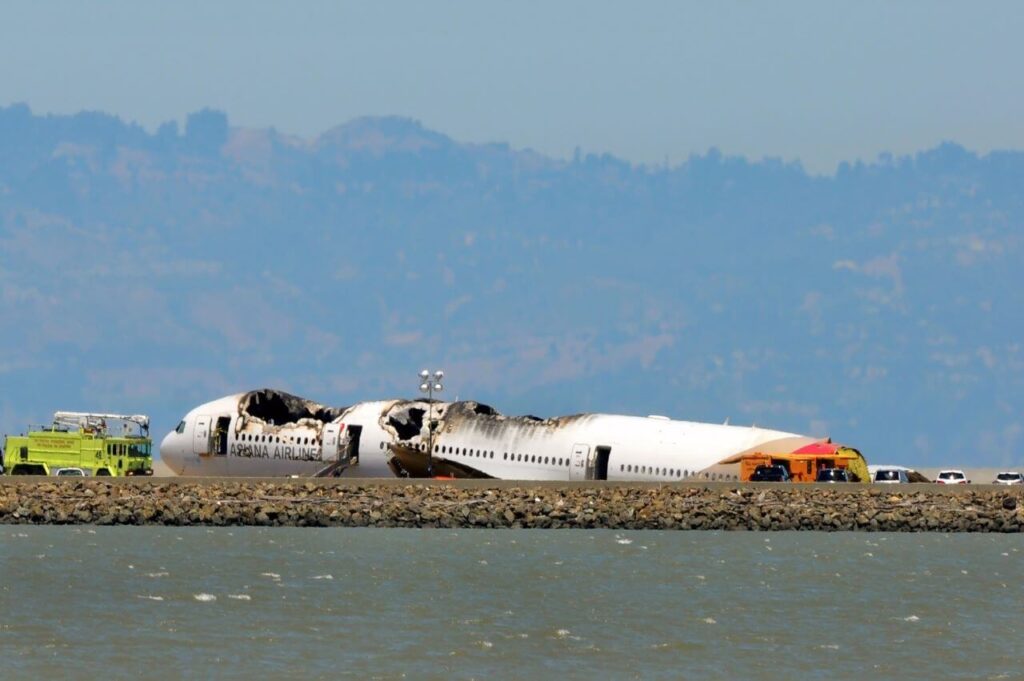A five years-long court battle over the 2013 deadly crash landing of Asiana Airlines flight 214 in San Francisco has finally resulted in victory, but not for the South Korean airline. The country’s Supreme Court confirmed on October 17, 2019, a government decision to temporarily suspend Asiana’s U.S.-bound route as penalty over the accident that officials say was caused due to the pilots’ misjudgment, resulting from insufficient training.
The back-and-forth court battle dates back to 2014, when South Korea’s Ministry of Land, Infrastructure and Transport issued an administrative order for the suspension of Asiana’s operations on the Incheon (ICN) – San Francisco (SFO) route. The country’s lower courts had determined that the 2013 crash landing of flight 214 in the U.S. city was caused by pilot error and the airline’s failure to properly train the flight crew.
The crash
Asiana Airlines Flight 214 crashed on July 6, 2013, when approaching the runway at San Francisco International Airport (SFO). The tail of the Boeing 777-200ER (reg. HL7742) struck a seawall short of the runway, sending the aircraft into a spin. Three teenage passengers were killed and 187 out of a total of 307 people on board were injured as a result of the plane’s hard impact with the runway and the ensuing fire. The aircraft was destroyed.
The final accident report released on June 24, 2014, following a joint investigation by the U.S. National Transportation Safety Board (NTSB) and South Korea’s Aviation and Railway Accident Investigation Board (ARAIB), determined that the probable cause of the accident was “the flight crew’s mismanagement of the airplane’s descent during the visual approach […] and the flight crew’s delayed execution of a go-around after they became aware that the airplane was below acceptable glidepath and airspeed tolerances”.
South Korean officials also acknowledged that the accident was “caused by a failure of the pilots to recognize unexpected operations of the autothrottle system”. The agency drew attention to the Boeing 777, raising the issue of a deficiency in the low-speed alert and speed protection of the 777 automation system, which it determined to be a contributing factor to the accident.
“ARAIB determines that additional Contributing Factor to the accident is inadequacy of the B777’s low airspeed alert and inconsistencies in the airspeed protection function,” the agency commented in the report. The NTSB issued recommendations for Boeing to consider modifying flight controls on the 777 jetliner and revise the 777 Flight Crew Operating Manual addressing the autothrottle mode.
The fallout
Troubles were not over for Asiana. In February 2014, the U.S. Department of Transportation (DOT) issued a half-million-dollar fine to the carrier for violating federal law by not adhering to the “family assistance plan” following the crash, NBC news reported at the time.
The support plan concerns the airline’s responsibility on contacting and providing necessary information to passengers and their families involved in the accident, including notifying the families as soon as the identities of passengers are verified, all of which Asiana failed to do in a timely manner, the DOT claimed.
Asiana was also hit with subsequent class action lawsuits from over 100 passengers onboard the deadly flight. And in 2016, Asiana reached a $3.45 million settlement with the city of San Francisco: about $1.2 million of the money were to go toward the city’s legal costs and another $1.6 million to the airport for damages resulting from the crash, according to The Japan Times.
The court battle
Meanwhile, Asiana, South Korea’s second largest carrier, embarked on a fight for the right to continue flights to the U.S. city. In November 2014, the country’s Transport Ministry ordered the airline to suspend flights on the San Francisco-bound route for 90 days. Officials later reduced the punitive time frame by half taking into account the carrier’s efforts to compensate the victims of the crash.
It did not take long for Asiana to win an injunction in January 2015, allowing it to continue operations to the U.S. city. Over the next two years, the Seoul Administrative Court and the Seoul High Court subsequently ruled in favor of the Transport Ministry’s order.
Pushing back, Asiana had requested to annul the ruling, but the plea has now been denied by South Korea’s Supreme Court. The airline is required to suspend the once-daily flight on the route for 45 days within six months. According to a statement by the Transport Ministry, quoted by Reuters, the flight ban should come into effect before the end of February 2020.
“We respect the court ruling. To minimize the inconvenience to our customers, we will consult with relevant organizations,” the carrier said in a statement to the The Korea Times. The company hopes that discussions with the authorities will also help minimize the expected $9.3 million (11 billion KRW) in losses resulting from the suspension.
Aside from San Francisco, Asiana also operates direct flies to New York (JFK), Chicago (ORD), Seattle (SEA), Los Angeles (LAX) and Honolulu (HNL) from its main hub in Seoul Incheon International Airport.
